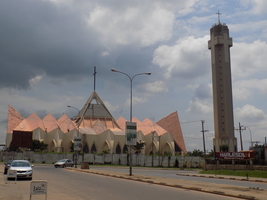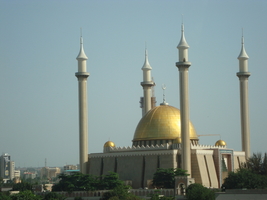Utrecht University, 30 October, 15.00-17.30, Janskerkhof 13, Stijlkamer.
Symposium held at the occasion of Murtala Ibrahim’s PhD defense.
African urban environments, and Nigerian ones in particular, have undergone a series of changes and transformations precipitated by increasing diversity, economic challenges, dissemination of new media and transnational influences. Christian, Muslim and traditionalist groups and actors deploy religion as a creative resource for adapting to changing environments and tackling emerging urban challenges; while at the same time they struggle to expand their membership, extend their influence and increase their audibility and visibility in the public sphere. In these dynamic and pluralistic urban settings, Islam, Christianity and indigenous religions become entangled with one another in a nexus of relationships that range from conflict, competition, conviviality, and even mutual borrowing. Understanding this complex plural religious configuration in urban spaces requires a new scholarly approach that brings together multiple religious traditions into a single comparative framework of study, rather than opting for an approach that focuses on a single religion. This symposium will explore various issues that arise from both inter- and intra-religious encounters and entanglements. The symposium will also investigate new methodological and conceptual frameworks that adequately address the intricacies of religious coexistence in African urban environments.
Speakers:
Murtala Ibrahim: Mobile Spirituality: Technology Mediated Religious Practices in Christ Embassy and NASFAT
Umar Danfulani: “Vengeance is Mine Says the Lord”: Driving Forces for Conflict and Search for Peace in the Face of Conflict in Central Nigeria.
Marloes Janson: Studying Religious Pluralism in Lagos (Nigeria): Assemblage as Conceptual Framework and Methodological Tool
Discussants: Peter Geschiere, Hansjörg Dilger, Rijk van Dijk
Chair: Birgit Meyer
Murtala Ibrahim (Utrecht University, Zentrum Moderner Orient, Berlin): Mobile Spirituality: Technology Mediated Religious Practices in Christ Embassy and NASFAT
This presentation will show how religious practices in Christ Embassy and NASFAT become entangled with new media technologies. Among the different aspects of new media, I will focus on mobile phone and how it assumed several religious functions in Nigeria. Mobile network operators, in their attempts to expand their sources of revenue, have profiled mobile phone as items in a massive digital spiritual market by creating and distributing religious services for subscription. I will look into how mobile phones mediate religious practices through hosting varieties of religious resources, such as sermons, Qur’anic recitations, religious music, texts, online religious performances and images among the members of NASFAT and Christ Embassy. Exploring similarities and differences in these practices among the two groups, I will show how they negotiate the use of new digital media in the light of their theologies. My main point is that a focus on new media technologies in Christ Embassy and NASFAT reveals how religious practices shape, as well as are being shaped by the new digital media.
Umar Danfulani (University of Jos): “Vengeance is Mine Says the Lord”: Driving Forces for Conflict and Search for Peace in the Face of Conflict in Central Nigeria.
From the beginning of the 21st century the Nigerian Middle-Belt has witnessed several ethnic-religious conflicts. This has occurred on the Jos Plateau, in the Benue valley, in Taraba and the whole of the north-east since 2001. It is against this backdrop that this presentation examines some of the driving forces behind conflicts in a predominantly Christian Middle-Belt/Central Nigeria. Furthermore, it is remarkable that both Muslims and Christians very often claim that their attacks against each other were reprisal attacks. I will therefore investigate the concept of vengeance to various ethnic minorities of the Middle-Belt, those of the Hausa and Fulani herdsmen. These various perspectives, which includes ‘doctrine of the Third Slap’ are compared with Biblical and Qur’anic concepts. The presentation thus delves into comparing religious teaching (theory-doctrine) and its implementation (practice). It answers questions such as: How do Christians and Muslim understand their respective scriptural teachings concerning vengeance or retaliation and forgiveness? In what ways are traditional religious rituals and beliefs concerning vengeance and forgiveness seeping into practical daily Christian and/or Muslim daily life?
Marloes Janson (SOAS, London): Studying Religious Pluralism in Lagos (Nigeria): Assemblage as Conceptual Framework and Methodological Tool
This presentation pleads for a reform of the study of religion – a reform that shifts the attention from a narrow analysis of Islam and Christianity as bounded entities structured around distinctive theologies, and of the ‘world religions’ and local versions of ‘traditional religion’ as diametrically opposed, towards a perspective that focuses on how Yoruba religious practitioners actually ‘live’ religion in their daily lives. Although I do not deny that Islam, Christianity, and Yoruba religion have their own distinctive traditions in Yorubaland in southwestern Nigeria, my point is that we should focus more on how ways of ‘living’ religion relate to each other. By focusing on lived religion and religious coexistence, it will become apparent that the idiosyncratic ways in which religion is performed in Yorubaland are often marked by contradiction and ambivalence rather than by neat divisions along religious boundaries. The challenge is thus to develop a new conceptual framework to explore mutual influences and interactions between Muslims, Christians, and practitioners of Yoruba religion. I argue that assemblage theory provides a perspective on religious pluralism beyond the well-trodden paths that take ‘syncretism’ as a conceptual frame, which presuppose the distinctness of religious traditions as the default and take religious mixing as a deviation. Rather than religious boundedness as norm and religious fluidity as anomalous, in Lagos’ multiform cityscape practices of religious pluralism are a rule rather than an exception. By taking assemblage as a heuristic device and methodological tool, I intend, following Berliner, ‘to bring back ambivalent statements, contradictory attitudes, incompatible values, and emotional internal clashes as research objects’ (Berliner 2016: 5).


